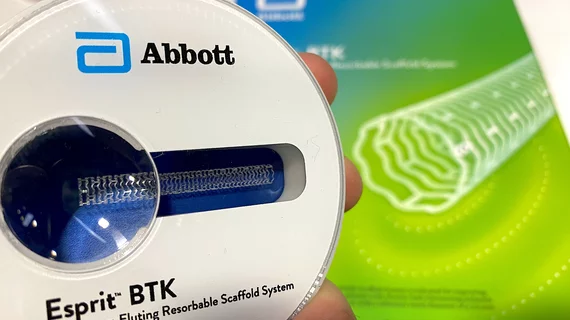Bioresorbable BTK stent superior to ballon angioplasty at 2 years
Late-breaking data from the LIFE-BTK clinical trial presented at VIVA 2024 demonstrated the long-term effectiveness of the FDA-approved Esprit BTK everolimus eluting bioresorbable scaffold system with severe peripheral artery disease (PAD) below the knee (BTK). According to the new research, the stent offered improved outcomes over balloon angioplasty with fewer repeat procedures at two years.
The Esprit BTK is a first-of-its-kind dissolvable stent for treating PAD below the knee, a region that has traditionally been hostile to the use of stents. This is why balloon angioplasty alone remains the current standard of care for PAD below the knee. The scaffold dissolves after about three years, providing support for the vessel after angioplasty until the vessel heals and can support itself on its own. Poor outcomes in BTK revascularization with angioplasty alone contributes to the need for repeat procedures and difficulty treating PAD when it evolved into critical limb ischemia, which leads to more than 400 amputations per day in the U.S.
"PAD is a dangerous condition that is complex to treat, with limited approved treatment options," co-principal investigator Brian DeRubertis, MD, with New York Presbyterian-Weill Cornell Medical Center, said in a statement. "Abbott's Esprit BTK System offers a new option for treating people with the most severe forms of PAD, helping to heal blood flow and potentially salvage limbs."
The two-year results show 90.3% of patients in the Esprit BTK arm did not require a reintervention at 24 months. Compared to balloon angioplasty, patients treated with the scaffold had significantly greater freedom from chronic limb-threatening ischemia (CLTI), which was the primary efficacy clinical event, 61.5% vs. 32.8%.
At one year, the trial's powered secondary endpoints revealed that Esprit BTK had a 35.2% improvement in reducing vessel re-narrowing compared to balloon angioplasty.
The Esprit BTK bioresorbable platform evolved from Abbott's previous Absorb coronary stent, which had a short-lived commercial life because of its thicker stent struts, issues with deliverability and poor outcomes with treating smaller vessels. However, the Esprit was designed with thinner struts and appears to be performing well in the niche BTK environment, where permanent metallic stents have not performed well.
Watch a video interview with Ramon Varcoe, MBBS, MS, PhD, who presented the one-year results of LIFE-BTK as a late-breaking study at TCT 2023.

